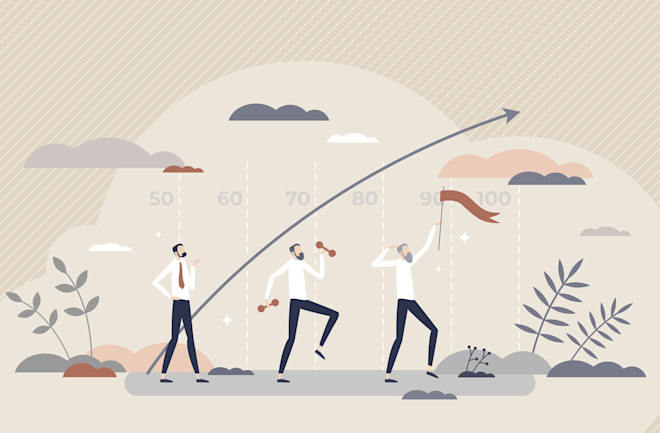
This at least calls the established survival meme into question and this has been long overdue. My own ancestry has mainly been about grandfathers living longest. That at least indicates a closer inspection of all those meta stats, rather than accepting the female survival meme.
And yes, we are coming out of a long era of male dominant smoking which is likely poorly adjusted for in the stats.
That has almost all gone away and today men and women both have become fitness buffs. who would have thought? I have lived through a generational revolution in terms of personal physical fitness. When I started running in Vancouver in 1972, almost no one ran at all. It slowly increased until most young people do try it on at least and are no stranger to it all. A fifty year transition. I only got serious because it was right for me.
New Study Finds Men May Outlive Women Instead
Recent research shows that males outlive females 25 to 50 percent of the time.
Aug 2, 2022 3:30 PM
(Credit: VectorMine/Shutterstock)
https://www.discovermagazine.com/health/new-study-finds-men-may-outlive-women-instead
In prior research, experts thought females had higher life expectancy than males. On average, American males live to 76, while females live to 81. But the reality isn’t that black and white. There’s a wide spread of lifespans within the sexes. And when ranges overlap, there’s a good chance that any male could outlive any female.
In a new study, researchers quantified the probability that a male outlived a female from the same time and place. They analyzed mortality data from 199 populations spanning all the continents, dating back to 1751.
Males outlived females 25 and 50 percent of the time, but the exact likelihood depended on demographic factors like education and marital status. “Not all females outlive males, even if a majority do. But the minority that do not is not small,” the authors say in a press release.
They measured that likelihood using the outsurvival statistic, which measures the "probability that a person from a population with a high death rate will outlive someone from a population with a low death rate," according to the press release.
At a value of 0.5, males have a 50-50 chance at outliving any given female from the same group. As outsurvival decreases, those odds dwindle.
For the last 250 years, outsurvival ranged from 0.25 to 0.5. It dipped from 1880 to 1970, probably because men began smoking more frequently, but it has been rebounding since then.
It’s counterintuitive, but countries near 0.5 aren’t necessarily paragons for health equity. Instead, they tend to have huge variation in female lifespans. The reasoning is this: If females die at young ages, they’re easy for males to outlive, which drives up the value.
In 1950s and 1960s India, for example, male outsurvival approached and oscillated around 0.5. But this was mainly because girls younger than five years old had astronomical death rates.
Risky behavioral tendencies and biological differences probably shorten male life span. For example, the Mother’s Curse hypothesis argues that natural selection can’t filter out harmful genetic mutations in male mitochondrial DNA. A second hypothesis argues that females’ second X chromosome guards them from genetic diseases like colorblindness or Duchenne muscular dystrophy. These genetic influences add up to shorten male survival.
Biological differences might mean that outsurvival statistics of 0.5 are unreachable unless health inequities kill females earlier. As the authors showed in the 1950s India example, interpreting the statistics without context could lead to misinformed interpretations of health justice.
Instead, it’s more informative to consider outsurvival alongside lifespan variation within each sex. For example, in France, males were just as likely to outlive females in 2018 compared to 1962. But the standard deviation of female lifespan — a measure of variation — dropped by six years. That means females didn’t die early, but males still managed to outlive them.
Contextualized interpretations of outsurvival could highlight equitable populations. It could also target lagging ones where governments can intervene. Used responsibly, outsurvival could provide a valuable public health tool that is far more comprehensive than life expectancy.
No comments:
Post a Comment